Book Commentary: Summer Reads for Adventurous Minds
Poetry’s secret, it seems to me, consists of two ingredients: a love of this world and a curiosity about metaphysics. – Durs Grünbein, The Bars of Atlantis
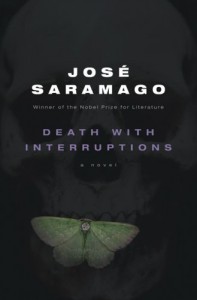 I resist the idea that books for the beach have to go down as easy as piña coladas. My eccentric and eclectic list of fiction and non-fiction in translation is made up of volumes that demand and repay close attention. They also meet Durs Grünbein’s requirements for poetry: they contain a zest for life and plenty of intellectual curiosity.
I resist the idea that books for the beach have to go down as easy as piña coladas. My eccentric and eclectic list of fiction and non-fiction in translation is made up of volumes that demand and repay close attention. They also meet Durs Grünbein’s requirements for poetry: they contain a zest for life and plenty of intellectual curiosity.
By Bill Marx
In addition, I feel that the intrepid group of small presses that publish books in translation should be rewarded for their courage and perseverance in hard times. Thus while I have included some of the first-rate books from major publishers, I highlight offerings from less mainstream presses as well. Note that many of the books covered by PRI/BBC’s World Books (which I edit) over the past few months, particularly Homesick and The Origin of the Species, are worth considering as well.
Feel free to send in other suggestions of worthwhile international fiction, especially those from the smaller publishers.
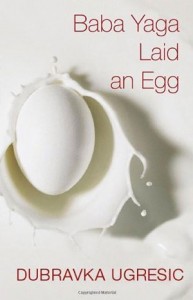 Baba Yaga Laid an Egg by Dubravka Ugresic (Translated from the Croatian by Ellen Elias-Bursac, Celia Hawkesworth, and Mark Thompson, Canongate) Ugresic’s surreal fable presents, in three sections, imaginative elaborations on the archetypal figure of Baba Yaga, an ancient crone who kidnaps small children. The volume deals with women, witchcraft, and old age on a number of levels: it is an affecting report on the indignities and blessings of aging, a (somewhat broad) satiric send up of capitalism in Eastern Europe, and an acerbic investigation into shifting social and mythic perceptions of women and power.
Baba Yaga Laid an Egg by Dubravka Ugresic (Translated from the Croatian by Ellen Elias-Bursac, Celia Hawkesworth, and Mark Thompson, Canongate) Ugresic’s surreal fable presents, in three sections, imaginative elaborations on the archetypal figure of Baba Yaga, an ancient crone who kidnaps small children. The volume deals with women, witchcraft, and old age on a number of levels: it is an affecting report on the indignities and blessings of aging, a (somewhat broad) satiric send up of capitalism in Eastern Europe, and an acerbic investigation into shifting social and mythic perceptions of women and power.
The Bars of Atlantis by Durs Grünbein (Translated by John Crutchfield, Michael Hofmann, and Andrew Shields, Farrar Straus, and Giroux) A simulating gathering of wide-ranging essays from Grünbein, who is considered by many critics to be one of Germany’s greatest living poets. He is certainly no slouch as a prose writer, writing with inspired clarity and deft learning about his childhood in Dresden, love of deep sea diving, and belief that poetry serves as a “memento suspended over the abyss of existence.” Along his serious but never solemn way, the writer castigates the ugliness of contemporary architecture, extols the relevance of the literature of antiquity (it stands for “the nontrivial, the nonbanal in linguistic reflection”), and provides smart elucidations of a number of intellectual heavyweights, including Friedrich Nietzsche, Gottfried Benn, and Georg Büchner.
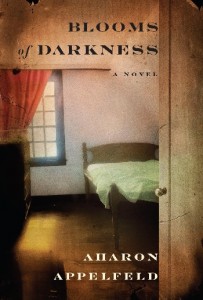 Blooms of Darkness by Aharon Appelfeld. (Translated from the Hebrew by Jeffrey M. Green, Schocken Books) Another compelling Holocaust narrative, one of his finest, from Appelfeld, who this time around grounds a tale of Jewish survival in an inspiring if grotesque love story. His previous novel in translation, Laish, was magnificent but grim-to-the-bone. Here Appelfeld provides much more emotional complexity, the story’s horror and suspense leavened by tenderness, even moments of humor. Hugo, an eleven-year-old Jew, hides from the Nazis in the apartment of a prostitute who serves German soldiers. Told from Hugo’s bewildered point-of-view (he spends most of his time in the woman’s closet), the novel methodically details the child’s sexual awakening and eventual romance with his savior, their passion coming to its inevitable end.
Blooms of Darkness by Aharon Appelfeld. (Translated from the Hebrew by Jeffrey M. Green, Schocken Books) Another compelling Holocaust narrative, one of his finest, from Appelfeld, who this time around grounds a tale of Jewish survival in an inspiring if grotesque love story. His previous novel in translation, Laish, was magnificent but grim-to-the-bone. Here Appelfeld provides much more emotional complexity, the story’s horror and suspense leavened by tenderness, even moments of humor. Hugo, an eleven-year-old Jew, hides from the Nazis in the apartment of a prostitute who serves German soldiers. Told from Hugo’s bewildered point-of-view (he spends most of his time in the woman’s closet), the novel methodically details the child’s sexual awakening and eventual romance with his savior, their passion coming to its inevitable end.
Case Closed by Patrik Ouředník (Translated by Alex Zucker, Dalkey Archive) This shaggy-dog send-up of TV detective yarns doesn’t really pay much attention to its manifold crimes (sneaky goings on in a retirement home, decade old murders, a rape), let alone punishments. Ouředník openly disdains plot; instead, he serves up a zany cultural critique of contemporary Czech society, its endemic incompetence and corruption unfazed by any of the political changes, authoritarian subservience comfortably giving way to capitalist phoniness. The sort-of main character, a prickly retiree named Viktor Dyk, sports a misanthropic sense of humor that made me laugh out loud, particularly his penchant for making up quotations from the Bible: “The eyes of the dead lend their sparkle to the stars.” “Proverbs 8:125.”
Death With Interruptions by José Saramago. (Translated from the Portuguese by Margaret Jull Costa, Harcourt) The Nobel Prize-winning writer passed away at the age of 87 on June 18, his funeral attended by over 20,000 people. His books, playful fables combining savage political satire with philosophical antics, have made him a popular writer in Europe. His novels, with their long paragraphs and sparse punctuation, never found that kind of acceptance here, though Blindness was made into a film. This 2008 effort isn’t one of his masterpieces (The Year of the Death of Ricardo Reis), but in light of his recent death this poignant and magnificently macabre meditation on death taking a holiday (“The following day, no one died.”) stands as a celebration of his ironic moral vision, a commitment to life’s underdogs that even embraces the Grim Reaper.
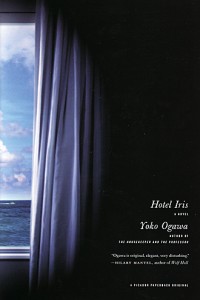 Hotel Iris by Yoko Ogawa. (Translated by Stephen Synder, Picador) Those looking for something kinky but classy this summer should turn to Ogawa’s strangely hypnotic tale of sadomasochism in a seaside resort on the coast of Japan. A bored seventeen-year-old, working at a beach resort, falls for an aging customer, a translator, who is all soft-spoken demurral in public but turns into a commanding sexual taskmaster in private. The tale is told from the innocent perspective of the girl, who never questions that submission brings pleasure. Critics who liked her earlier book in translation, The Housekeeper and the Professor, have been put off by the creepy eroticism, but Ogawa’s subtle exploration of the subterranean connections between pleasure and control elaborates on the psychological probing of Tanizaki Jun’ ichiro (The Key).
Hotel Iris by Yoko Ogawa. (Translated by Stephen Synder, Picador) Those looking for something kinky but classy this summer should turn to Ogawa’s strangely hypnotic tale of sadomasochism in a seaside resort on the coast of Japan. A bored seventeen-year-old, working at a beach resort, falls for an aging customer, a translator, who is all soft-spoken demurral in public but turns into a commanding sexual taskmaster in private. The tale is told from the innocent perspective of the girl, who never questions that submission brings pleasure. Critics who liked her earlier book in translation, The Housekeeper and the Professor, have been put off by the creepy eroticism, but Ogawa’s subtle exploration of the subterranean connections between pleasure and control elaborates on the psychological probing of Tanizaki Jun’ ichiro (The Key).
Oliver VII by Antal Szerb (Translated from the Hungarian by Len Rix, Pushkin Press) A Central European country is so deep in debt it has to sell itself to the highest bidder. A disgruntled king organizes a revolution so he needn’t take responsibility for the sale. Those are the surprisingly relevant quandaries tossed about in Szerb’s blithe but pointed entertainment, the last novel the writer, whose parents were assimilated Jews, completed before he disappeared in a labor camp in 1945 at the age of 43. Over the past few years, Len Rix and Pushkin Press have presented superb translations of Szerb’s impish fiction; Journey By Moonlight stands as his highest artistic achievement, but this book is a delight, a thoughtful romp that fits knotty issues of authority, nationalism, illusion, and identity into a stage farce structure. The king, hiding away in Venice, is forced by con men to act as the head of state in order to steal from . . . himself. Szerb proffers an amusing variation on the message of Max Beerbohm’s “The Happy Hypocrite: A Fairy Tale for Tired Men”—act a role long enough and you become what you impersonate.
The Private Lives of Trees by Alejandro Zambra (Translated from the Spanish by Megan McDowell, Open Letter) A gentle tale of longing narrated by a professor of literature who, while waiting for his wife to return home, muses on his past and what his step-daughter will think of him and the novel he is working on. A graceful testament to the ambiguities of memory and communication, the novel wisely never lets tired strains of angst or regret overwhelm “a love of this world.” Zambra’s first book, Bonsai, won Chile’s Literary Critics’ Award for Best Novel; it was translated into English and published by Melville House.
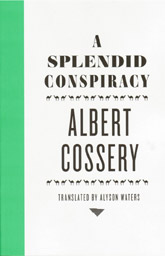 A Splendid Conspiracy by Albert Cossery (Translated by Alyson Waters, New Directions) The novel’s worship of indolence is tailor made for vacation reading. In fact, if Cossery (1913–2008) had his way you would never go back to work. The writer left Egypt as a young man for Paris, where he hung out with Albert Camus and other French intellectuals while leading a life of hedonism (he estimated he had slept with over 2,000 women). Cossery’s fiction financed his bohemian lifestyle and promulgates his anarchistic perspective. This 1975 novel features a police inspector in a small Egyptian town who suspects “terrorists” are kidnapping and/or killing some of its most notable citizens. Cossery’s gang of gleeful indigents, who mock everything but leisure and sex, are suspected to be the culprits. In one striking passage, the ringleader of the laid back crew expresses sympathy for those dedicated to destruction: “The tiniest bomb that explodes somewhere should delight us, for behind the noise it makes when it explodes, even if barely audible, lies the laughter of a distant friend.” A fascinating read in the age of terrorism . . .
A Splendid Conspiracy by Albert Cossery (Translated by Alyson Waters, New Directions) The novel’s worship of indolence is tailor made for vacation reading. In fact, if Cossery (1913–2008) had his way you would never go back to work. The writer left Egypt as a young man for Paris, where he hung out with Albert Camus and other French intellectuals while leading a life of hedonism (he estimated he had slept with over 2,000 women). Cossery’s fiction financed his bohemian lifestyle and promulgates his anarchistic perspective. This 1975 novel features a police inspector in a small Egyptian town who suspects “terrorists” are kidnapping and/or killing some of its most notable citizens. Cossery’s gang of gleeful indigents, who mock everything but leisure and sex, are suspected to be the culprits. In one striking passage, the ringleader of the laid back crew expresses sympathy for those dedicated to destruction: “The tiniest bomb that explodes somewhere should delight us, for behind the noise it makes when it explodes, even if barely audible, lies the laughter of a distant friend.” A fascinating read in the age of terrorism . . .
A Time for Everything by Karl O. Knausgaard (Translated from the Norwegian by James Anderson, Archipelago Books) Angels are definitely not to be fooled with in Knausgaard’s powerful recasting of God’s celestial pecking order. In the sixteenth century an eleven-year-old boy glimpses what he believes are a pair of angels in the woods. Thus begins a psychologically crippling, life-long obsession with all things angelic, a search that uncovers fascinating suggestions that angels may be the tortured offspring of man and the divine trapped between two realms, the earthly and the transcendent. Knausgaard provides memorably concrete reinventions of Bible stories as well, from a topsy-turvy telling of Cain and Abel to a shocking version of Noah’s ark, told from the point of view of those who are left to drown as the big boat floats by.
Order these books through the Amazon link on the page and The Arts Fuse receives a (small) percentage of the sale.

Ooooooh… thanks!
Thank you for such a splendid list.
I’m the translator of Cossery’s Splendid Conspiracy. Thanks for posting it on your summer reading list! It is, indeed, a read for an “adventurous mind.” Bravo for all the other books on the list, too. Great choices!